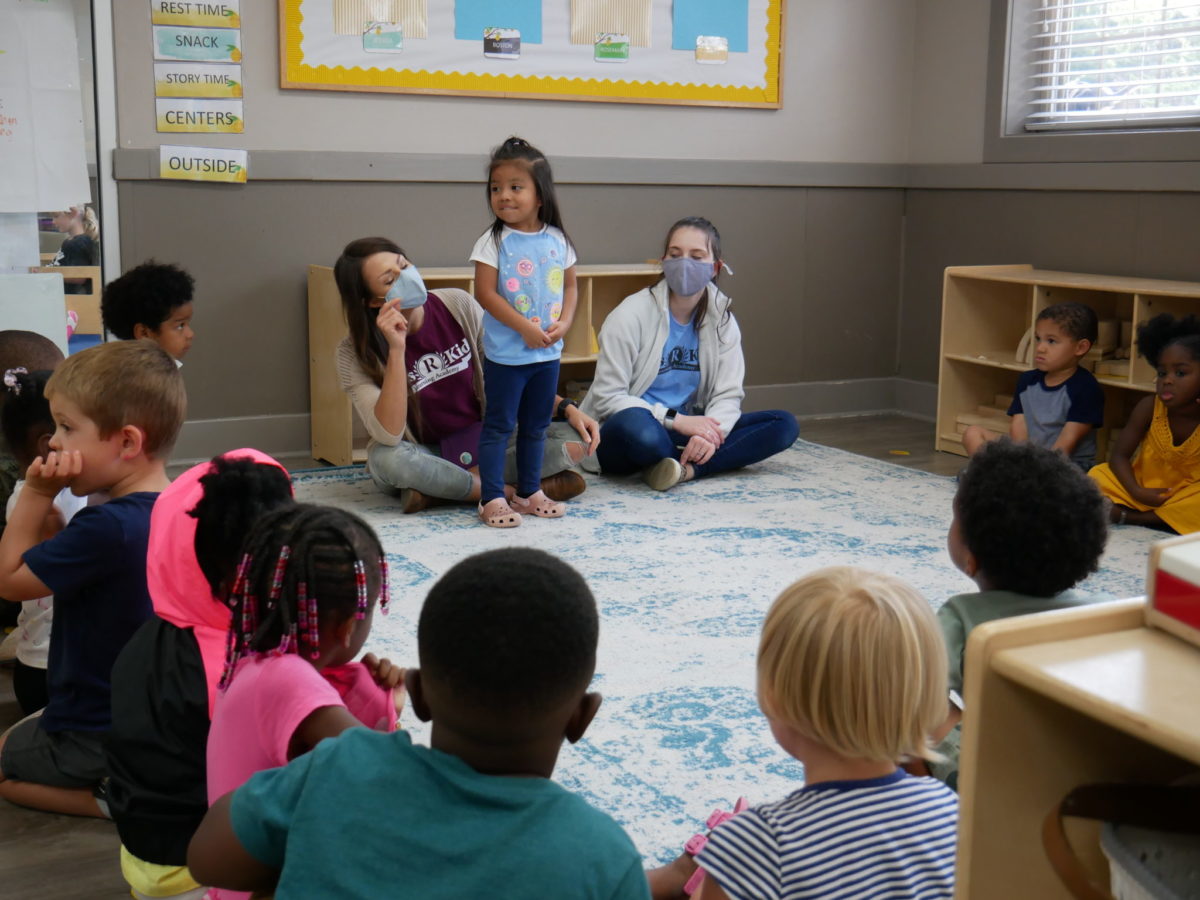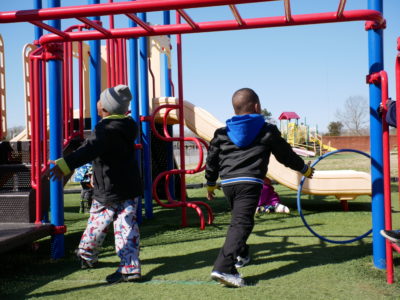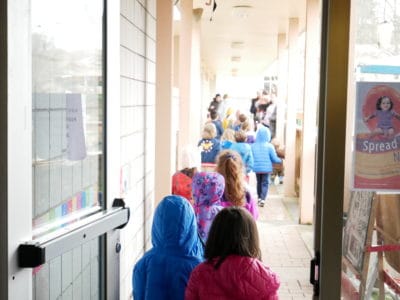

Share this story
- For @ncsmartstart's @ascubbage, the Hunt-Lee report "is a recommitment — a re-emergence, if you will — of North Carolina's commitment to early childhood education." Here's a breakdown of the #earlychildhood proposals. #nced
- Top North Carolina education and policy leaders worked for eight months to find points they could agree to prioritize. Strengthening early care and education was a major one. #nced
|
|
Leaders on both sides of the aisle and across sectors worked for the last eight months to find common ground on how to improve education in North Carolina.
Finding agreement in a divisive climate, their answer to that question centered on the importance of early learning and development.
“It really is a recommitment — a re-emergence, if you will — of North Carolina’s commitment to early childhood education,” Amy Cubbage, president of the early childhood network Smart Start, said of the report released last week by the Hunt-Lee Commission.
Proposals to strengthen the state’s support for children in their earliest years — from increasing access to home visiting and early learning, to elevating the early childhood teaching profession — were embedded throughout the report.
“This group did not set out to develop a comprehensive plan for North Carolina education,” the report says. “Rather, its members sought to look across our education system and identify areas of consensus from which we can build trust and forward momentum.”
Those “areas of consensus” included ideas on how to address fundamental challenges of early care and education: how to pay early childhood teachers more, how to expand the supply and affordability of child care and pre-K, and how to support families during the transition to parenthood.
You can find a breakdown below of how the commission suggests moving forward on behalf of the state’s youngest learners.
The commission, brought together by The Hunt Institute, included influential legislators, leaders from across the education continuum, philanthropic and nonprofit partners, and heads of cross-agency departments. Top Republican legislative leaders and Democratic Gov. Roy Cooper backed the commission.
The pandemic has emphasized the importance of early care and education for children’s futures and the workforce’s strength, said Sen. Mike Lee, R-New Hanover, who served on the commission.
“North Carolina has a long history of early childhood leadership from Smart Start, to More at Four and now NC Pre-K, so it’s never a surprise to see it become a part of the policy conversation, but I think that the pandemic has also brought these issues very close to home for a lot of North Carolinians,” Lee said in a statement. “Based on the data the Commission reviewed, the importance of stable, high-quality early education experiences and a high-quality workforce have never been more apparent.”
So what are the early childhood priorities?
The recommendations are split into three categories — “build on what we have,” “invite and test new ideas,” and “implement proven solutions.”
When it comes to building on what the state has, the commission recommended increasing access to child care and pre-K through funding shifts in the state’s subsidy program and its NC Pre-K program.
Expanding child care subsidy access
The subsidy program helps pay for child care for families who earn up to 200% of the federal poverty level, but it has large waitlists across the state and does not provide enough per child to pay living wages to teachers.
The state Department of Health and Human Services (DHHS) is hiring an outside group to study its subsidy model this year. More funding would be needed to pay higher subsidies and reach more children and families. The program, funded mostly by federal dollars, was serving 56,708 children in February 2022 compared with a little more than 70,000 in February 2019.
The report recommends studying new ways to fund child care subsidies that would reach more children and families, such as increasing the number of subsidies available, raising the maximum amount parents can receive, and scaling the amount based on family income.
NC Pre-K funding boosts, and pay parity
NC Pre-K, the state’s public preschool program, saw a large drop in enrollment during the pandemic. This school year it was back to about 80% of pre-pandemic levels, according to DHHS.
But even before the pandemic, the program reached only about half of eligible 4-year-olds. Legislators have tried to expand its reach, running into such problems as space, a stagnant reimbursement rate, and staffing issues.
This report says the state should address these barriers by increasing the rate per child that providers receive from the state, increasing the amount of funding allowed to be used for administrative purposes, and providing pay parity between teachers in private centers and public schools to help stop the churn of high-quality teachers leaving private centers for more compensation and benefits.
A competitive grant program for elevating the early childhood teaching profession
The report asks the state to invite and test new ideas for some fundamental early childhood challenges: making early childhood teaching a viable career and increasing the supply of infant and toddler care.
Many programs are struggling to find and retain teachers, with an inability to provide livable wages. The report mentions some commission members who hesitate to encourage students to pursue early education without the opportunity for economic stability. The median hourly wage for a child care teacher in North Carolina in 2019 was $10.62.
The report suggests establishing a competitive grant program for localities to test pilots. Those pilots, the report says, should consider expanding education incentives and wage supplements like WAGE$ and AWARD$, using recruitment bonuses, wage increases, matching wages to K-12 educators, career pathways, and opportunities to access the state benefits system.
“Based on the findings from these pilot programs, the state can evaluate the cost / benefit of different approaches and identify the most promising strategies to expand into additional counties,” the report reads.
Incentivizing more care for infants and toddlers
Access to affordable and high-quality early care and learning is hard to come by. It’s especially so in the first three years of life.
Child care for infants and toddlers largely relies on private tuition, which is often too high for parents but not high enough to cover the true cost of high-quality programs. Caring for the youngest children is more expensive than pre-K because of how many professionals are needed to maintain small ratios.
The report recommends “a series of pilots” to incentivize more slots for infants and toddlers, including grants for centers to open infant/toddler classrooms and increases in the subsidy rates for the youngest children.
“In so doing, however, it is also critical that evaluators consider the potential impact on slots for three- and four-year-olds,” the report reads.
What’s proven: Expanding home visiting
The report calls out Family Connects Durham, which provides a free home visit from a nurse to all families in the first three weeks after birth, as an example of a program that works and is ready to be scaled.
A study published in 2013 found that the program saved three dollars for every dollar spent by decreasing the number of families’ emergency room visits and overnight hospital stays in the first six months.
Although home visiting programs vary in focus and approach, they are often aimed at providing holistic support to families as they bring a child into the world.
The report suggests expanding the reach of these programs, which in 2019 reached about 2% of families with children under 5 years old. The report suggests using the Smart Start network to house these programs. Most of Smart Start’s 75 local partnerships already have a home visiting program.
Cubbage called this a “big step and an innovation.” She pointed to the state’s infant mortality rate, and the racial disparity in those numbers, as the most critical reason for more investment in supports like home visiting.
“I think that the time has come,” she said. “We can’t start any of the conversations any longer beyond the first days. We are losing children.”
Will the recommendations make an impact on policy?
As we head into the short legislative session, Rep. Ashton Clemmons, D-Guilford, called the report “a good springboard” for advancing conversations on early childhood policy.
Next year’s long session is more likely to see conversations about more child care funding, as stabilization grants from the American Rescue Plan Act (ARPA) start to expire, Clemmons said in an interview.
“As we move to the long session, and as we see the ARPA cliff talked about in early child care … I think this just strengthens those conversations.”
Lee said the same in an EdNC interview — that the short session probably won’t provide enough time for advancing these ideas.
“The structural aspects of the short session are more challenging than the actual policy perspective,” he said.
But the long session is a different story, Lee said.
“By virtue of coming to the recommendations in a bipartisan way, I think from those things that live inside the walls of the General Assembly, I’m hopeful we’ll be able to move forward with a lot of the recommendations,” Lee said.
Clemmons said the report is one step in the right direction.
“We cannot start talking about the success of our education system pretending that that begins at age 5 and kindergarten,” she said. “We know very clearly that whether our children succeed or not begins much earlier than kindergarten.”





